New study says kids with smartphones have less anxiety and depression
The study, which surveyed 1,510 children in Florida, revealed that smartphone owners are more likely to spend time in person with friends.

Smartphone.
A recent study from the University of South Florida (USF) challenges the prevailing narrative about smartphones' negative effects on children.
The research, led by Justin D. Martin, found that 11- to 13-year-olds who own a smartphone report better outcomes on multiple well-being indicators than their peers without these devices.
"We went into this study expecting to find what many researchers, teachers and other observers assume: smartphone ownership is harmful to children," Martin said. However, "most of the time we found the opposite—that owning a smartphone was associated with positive outcomes."
Surprising results
The study, which surveyed 1,510 children in Florida, revealed that smartphone owners are more likely to spend in-person time with friends, averaging nearly three days a week versus two days for those without a phone.
"Contrary to the position that smartphone use is associated with fewer in-person meetups with friends, on average, smartphone owners spend nearly three days a week in-person with a friend(s), while kids with no smartphone spend closer to two days a week in-person with friends," the researchers write.
"The same trend was seen for tablet ownership, daily video gaming, and daily social media use."
In addition, 80% of children with smartphones claimed to feel good about themselves, compared with 69% of those without.
As for anxiety and depression, children with phones reported fewer symptoms: only 18% agreed that "life often feels meaningless," compared with 26% of those without a device.
Another notable finding is that children with smartphones are less likely to experience cyberbullying. For example, 32% of children without a phone reported that rumors or lies were spread about them online, compared with 18% of those who do have one. Likewise, 28% of children without phones received online insults, compared with 16% of smartphone owners.
Not all is positive
Despite the encouraging results, the study points out some negative aspects. Children who sleep with their phones in the bedroom get less rest, with an average of 8.6 hours of sleep per night. In addition, intensive users of social media and video games reported more difficulty disconnecting from technology and, in some cases, problems sleeping.
The children who post frequently on social media also showed greater symptoms of anxiety and depression, possibly due to exposure to offensive comments.
Factors to consider
The study cautions that external factors, such as family environment or socioeconomic status, could influence the differences between children with and without phones.
Interestingly, children from families with lower incomes ($50,000 or less) are more likely to have smartphones (80-87%) than those from families with incomes above $150,000 (67%). This suggests that phone ownership is not strictly linked to wealth.
Varied use of technology
The study also highlights how children use their devices. Although social media is popular (87% use apps such as YouTube or TikTok), 94% reported using apps for school. In addition, usage patterns vary by socioeconomic status: children from lower-income households prefer Roblox and YouTube, while those with higher incomes opt for Instagram and TikTok.
A broader perspective
These findings align with a recent article published in The BMJ, where international experts argue that banning smartphones or social media does not guarantee an improvement in children's well-being.
According to the article, school restrictions in England did not show clear benefits on mental health, sleep or academic performance, nor did it reduce overall technology use. The authors warn that the bans could even be counterproductive, failing to prepare children for responsible technology use in adulthood.
Next steps: More research
USF researchers plan to expand the survey nationwide. The goal is to follow 8,000 adolescents for 25 years to analyze how technology habits impact their long-term well-being.
Meanwhile, this study suggests that the effects of smartphones are more complex than alarmist headlines often portray.
As Wendy Rote, Associate Professor of Psychology at USF, points out, "the effects of smartphone ownership are complex," and simplistic solutions, such as blanket bans, may not be the right answer.













